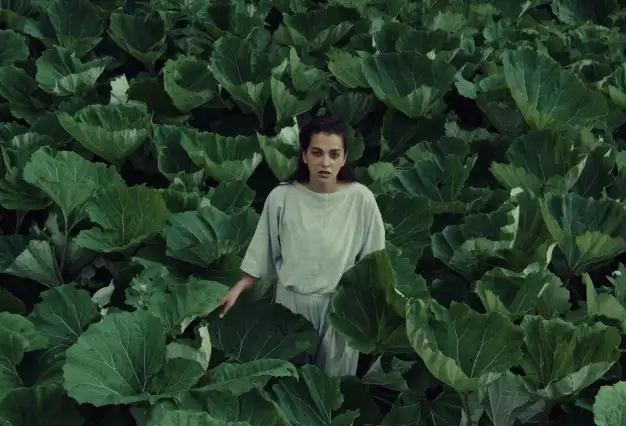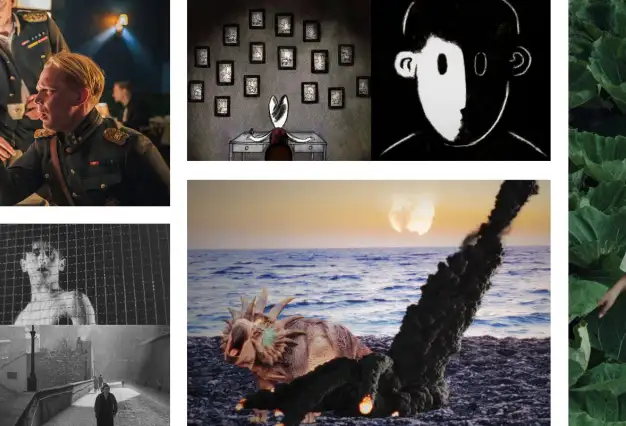
17 July 2025
Czech Film Springboard 2025: Generation unsettled
Czech Film Springboard 2025: Generation unsettled

The 2025 edition of Czech Film Springboard once again showcases the breadth of the country’s emerging auteur voices, with works in progress ranging from socially charged genre hybrids to intimate family dramas to political satire. This year’s selection reflects a cinema in dialogue with enduring human conflicts as well as the urgent contemporary realities of economic precarity, bodily autonomy, ethnic tension, and the miscommunications that fuel crises. Presented to a forum of international industry professionals, the projects offer a cross-section of Czech filmmaking in transition, from first-time directors making their feature debuts to returning talents expanding their creative range.
by Martin Kudláč for CZECH FILM / Fall 2025
Disillusioned generations on heist
Following his Venice-premiered After Party and sophomore feature The Other Side of Summer revealed at the Karlovy Vary IFF this summer, Czech director Vojtěch Strakatý is working on his third feature, No Salvation Coming, a socially driven drama about economic despair and the blurred moral boundaries of survival. Produced by Ondřej Lukeš and Jan Čadek of Beginner’s Mind, the project melds generational critique with the genre elements of a heist story.
Set in a precarious present, where even holding multiple jobs doesn’t mean/guarantee a person can make rent, No Salvation Coming follows a group of underemployed millennials and Gen Zs: an adjunct academic, a part-time paralegal, a dancer living out of her car, and a student sleeping at the airport. When they realize there is no legal way to bridge the gap between their qualifications and their debt, they decide to rob the luxury villa that one of them cleans for extra cash. The director’s debut, After Party, looked at the aftermath of a father’s reckless handling of family finances. No Salvation Coming is a heist film grounded in everyday struggle and generational disillusionment. Strakatý’s characters are not professionals, nor are they reckless thrill-seekers; they’re exhausted, broke, and out of time. With No Salvation Coming, Strakatý continues his exploration of economically marginalized characters who defy expectations through calculated desperation. The heist may be imperfect, but it’s the only solution they have.
Currently in development, No Salvation Coming is supported by the Czech Audiovisual Fund. The producers are seeking coproducers and international partners primarily in Western Europe. Development is expected to last until autumn 2026, with principal photography set for spring 2027 and postproduction lasting until the end of 2027 with preliminary premiere in 2028.
Mothers, daughters, and secrets
Czech screenwriter-turned-director Ondřej Erban, whose short One Hundred and Twenty-Eight Thousand (2018) has been selected for Cannes Cinéfondation and shortlisted for BAFTA, is working on his feature-length debut, Happy End, written together with Barbora Námerová (Filthy, Nightsiren).
In Happy End, the fiercely driven single mother Ivana secretly adopts the seductive persona Vivien as she steps into the clandestine world of erotic massage. Initially a financial move to support her daughter Martina’s dream of earning a sports scholarship in the United States, the decision brings Ivana unexpected pleasure, sensual liberation, and a newfound sense of control. As Vivien, she transforms necessity into a thrilling ritual of secrecy, pleasure, and personal power. But when Martina, whose athletic ambitions hinge entirely on her mother’s hidden sacrifices, uncovers Ivana’s double life, their relationship ignites. Boundaries blur, revealing unspoken desires and deep vulnerabilities, compelling both women to confront the exhilarating and perilous truths of their shared existence.
Narrated through both Ivana’s and Martina’s personal perspectives, Happy End pulses with physicality, interweaving Martina’s disciplined athleticism with Ivana’s sensual awakening. Inspired by the raw sensuality of How to Have Sex, the youthful abandon of American Honey, and the uninhibited intimacy of That Kind of Summer, Erban captures a kinetic, immersive exploration of desire, ambition, and bodily autonomy.
Produced by Tomáš Hrubý and Hana Šormová of nutprodukce (Summer School, 2001, Victim) with a track record at major festivals, Happy End continues the company’s commitment to stories that engage regional realities through auteur voices. The project is currently in development with coproduction ties to Slovakia. International sales, financing partners, and postproduction collaborators are currently being sought. With Happy End, Erban positions himself as part of a new wave of Central European filmmakers exploring gendered experience with emotional clarity and formal rigor. His film looks at the cost of care not only in money, but in silence, body, and identity, unfolding a private act that, once exposed, forces both mother and daughter to confront the stories they’ve told each other to survive.
End-of-life road trip
The production outfit nutproducke is also behind the joined directorial debut of Anna Wowra and Vojtěch Novotný, To Move Mountains. Mája, a 29-year-old botanist battling leukemia, convinces her husband, Tomáš, to take a spontaneous trip across Europe, framing it as a break from treatment. But the discovery of a bone marrow donor, news she keeps to herself, complicates the postponed honeymoon. For Tomáš, the journey is a sign she’s recovering; for Mája, it’s a space to reflect, and possibly to say goodbye. As the couple moves from Italy to France and toward the English coast, moments of joy and intimacy blur with the weight of unspoken decisions.
Inspired by Wowra’s own experience of serious illness in early adulthood, the film resists the traditional cancer story framing as either heroic struggle or tragic ending. Instead, it focuses on the right to choose and the emotional labor of letting go. Told in double perspectives, one for each partner, with each director following one narrative strand, the film offers overlapping perspectives on shared moments, gradually merging as the couple confronts their diverging needs. By splitting authorship, Wowra directing Mája’s scenes and Novotný Tomáš’s, the filmmakers embed the duality into the production itself. Their shared feature-length debut transforms personal experience into a European road movie about love, mortality, and autonomy.
Hana Šormová and Tomáš Hrubý are producing the film and are currently seeking Polish coproduction partners, sales representation, and postproduction support. The directors intend to shoot on location across Central and Western Europe, prioritizing authentic geography.
Desire and prejudice
Emerging Czech filmmaker Petr Pylypčuk builds on the success of his short Eighth Day (2023), which premiered in the La Cinef competition section at Cannes, with his feature debut, Eli and Them, a fish-out-of-water story about a teenager whose camera becomes both a tool for discovery and a catalyst for conflict.
Set at the tail end of summer, the story follows 17-year-old Eli, sent by her parents to spend the holidays at her 30something sister’s farm. Instead of studying for her failed school exams, Eli begins filming her rural surroundings, escaping boredom through the lens of a camcorder. Her quiet detachment soon gives way to entanglement, as she becomes drawn into the web of a local crisis involving a burned-down house in a nearby Romani settlement. As the community fractures over the event, Eli is caught between two figures: Adam, a withdrawn farmhand wrestling with his own heritage, and Mariana, a charismatic Romani teenager with strong suspicions about the fire’s origins. Eli’s interactions with Adam and Mariana pull her deeper into the escalating dispute, culminating in a violent confrontation with unintended consequences.
Eli and Them engages with structural and personal racism, but does so from an oblique angle, through the eyes of a protagonist too young to fully grasp the implications of her actions, yet old enough to be changed by them. Pylypčuk’s approach highlights the volatility of adolescence as a prism through which broader social tensions are refracted while portraying the darkly funny microcosm of a small village full of complex issues. A key element of the film’s aesthetic is the integration of Eli’s own camcorder footage into the storytelling. Pylypčuk cites the use of point-of-view material as central to conveying the protagonist’s inner world, with sequences captured by Eli’s camera serving as both documentation and self-mythologizing. The project’s themes of alienation, ethnic tension, and emotional projection are grounded in the director’s own experience growing up in a North Bohemian village.
Backed by the Czech Audiovisual Fund, Eli and Them is currently in development. Czech production company Perfilm (March to May, If I Ever Lose My Eyes) is seeking international partners for coproduction and postproduction collaboration, with principal photography expected to commence in 2026.
Crushing into crisis
After directing the Venice-awarded Ordinary Failures and codirecting the CANAL+ period bio-pic miniseries Daughter of the Nation, Prague-based Hungarian-Romanian filmmaker Cristina Groșan is developing her next feature-length project, Dead Mountain. The film–cowritten with French screenwriter Loïc Barrère, who also worked with Grosan on her small screen project Angelmaker—is a dark social satire set in a foggy Czech mountain village, where teenage desire and military paranoia collide in a fictional present shaped by the undercurrents of real-world geopolitics.
A 17-year-old boy flies a toy drone to impress the daughter of a foreign soldier stationed at a nearby NATO base, only for it to crash inside the military perimeter. What begins as a harmless, crush-fueled gesture spirals into a military investigation, escalating misunderstandings, and collective hysteria. As the army clamps down and the villagers project their fears and frustrations, the shy teen Lukáš is unwillingly cast as the figurehead of a resistance movement that never existed. All he really wanted was a date with Erin, the enigmatic French girl caught between teenage rebellion and her father’s uniformed authority. Written and directed by Groșan, with dramaturgical collaboration from Jakub Režný, Dead Mountain draws on the director’s cross-border background to examine how suspicion, spectacle, and misinformation shape reality, especially in environments where political tension and youthful disillusionment coexist. The film loosely references the 2008 Brdy radar controversy in the Czech Republic, reimagining it as a story shaped by miscommunication, social media amplification, and latent national anxieties.
Produced by Marek Novák of Xova Film, who also produced Ordinary Failures, the project received first-draft development support from the Czech Audiovisual Fund. It was also backed by Creative Europe MEDIA and was selected for the ACE Producers workshop. The producers are currently seeking coproduction partners, primarily in France, Hungary, and Romania, and postproduction collaborators across Europe.




